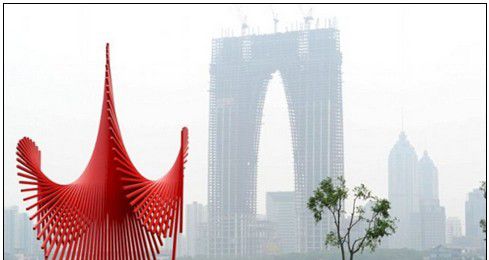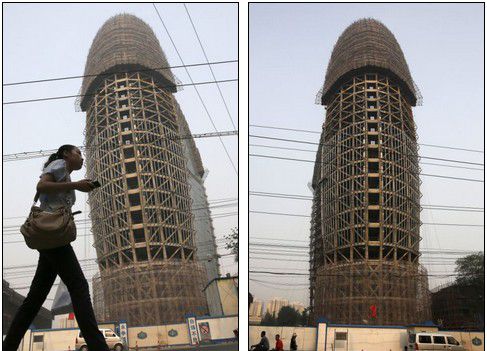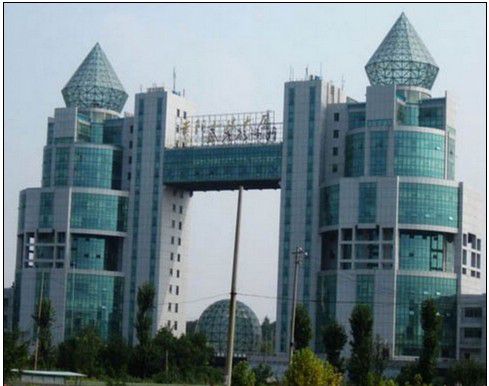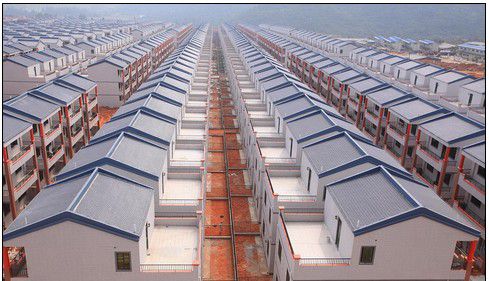盘点中国那些奇形怪状的建筑(图)
|
爱思英语编者按:中国从来不缺奇特建筑。如果你遗憾没见过龙,可以去“盘古大观”看看;如果你想领略弗洛伊德的精髓,可以去央视大楼逛逛;再转一圈,你还可以看到神仙,铜钱,戒指。只是有些人开始疑问:我们是该感谢这些建筑让世界变得多样,还是该诅咒让眼睛受到迫害? Some of these spectacular buildings epitomise the daring architecture we have come to expect from the nation that gave us the magnificent Bird's Nest stadium. But others have provoked roars of laughter and been lampooned the world over. Welcome to the weird and wonderful world of modern Chinese architecture.
As the vast country's building boom continues, huge and ever-more fascinating superstructures have been piercing the skylines. From giant behemoths that look like long johns to one in the shape of a giant traditional Chinese coin, not all have gained critical approval. In a survey by Chinese architectural firm, Archcy, online voters ranked Pangu Plaza, used during the 2008 Beijing Olympics, as one of the ugliest buildings in the People's Republic. A particularly garish building in the northeastern city of Fushun made with over 3,000 tons of steel and decorated with 12,000 LED lights was also chosen. As was the Beijing Tianzi Hotel which was ranked China's ugliest building for 2012. It is fronted by three men depicting Chinese gods and symbols of prosperity, happiness, and career achievement. Then there's the Shanghai LV Building, which looks like a giant boot. Most unfortunate of all is perhaps the new Beijing headquarters of the People's Daily newspaper in Beijing.
The construction, with its phallic-like connotation, has become an object of ridicule among Chinese citizens. The People's Daily is the official mouthpiece of the Chinese ruling party. There have also been numerous other examples of massive building projects that have attracted more admirers that detractors. For example there's Beijing's new Phoenix International Media Centre which has a distinct, caved-in hollow, almost like a giant Yorkshire pudding. With its sweeping metallic curves and shimmering glass exteriors, it is scheduled to open this year.
The 55-metre tall building created by the Beijing Institute of Architectural Design will boast 65,000 square metres of floor space for offices, restaurants and the headquarters of China's Phoenix TV. And while it may look like a giant bean bag, or even a doughnut, the critics have been more welcoming of this building. Its sleek, spiralling design 'boldly expresses its intentions to move away from tradition toward the open ideals of the future,' says the website of China Radio International. Then there's perhaps the most famous modern Chinese building of them all, the Bird's Nest stadium in Beijing. It was used to spectacular effect for the opening ceremony of the 2008 Beijing Olympic Games. A thundering display of fireworks exploded over the stadium in the shape of a blossoming red flower as China put the full glory of its rich history on display to the world. Some 91,000 people, many waving Chinese flags, packed into the National Stadium on a hot and humid night for a spectacular show masterminded by Oscar-nominated filmmaker Zhang Yimou. In Lingshui County in the Hainan Province on an island off southern China, more than 1,000 grey houses, each spaced just a few feet apart, have been built. Stretching as far as the eye can see in rows upon rows of arrow-straight uniformity, this development conjures images of a concrete slum or a prison block rather than a plush new housing estate.
|












 S
S








